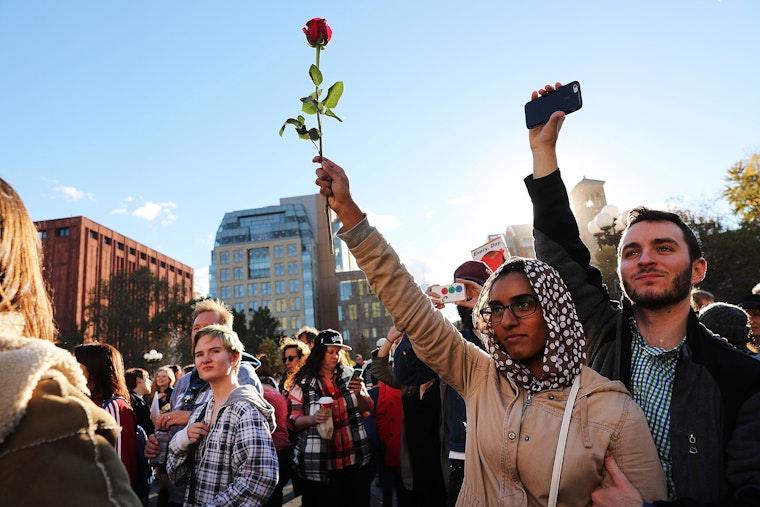Hope on the Road Ahead
By Chris Stone

Last week, the world turned upside down as Donald Trump was elected the 45th President of the United States. It may well prove to be one of the most consequential weeks of our lives. For now, however, we need to focus on the road right in front of us.
Trump’s shocking victory was difficult enough to absorb. But the shock was exacerbated by a surge in hate crimes and other incidents that confirmed the worst fears raised by the vicious campaign. In the first 60 hours after Donald Trump’s victory speech, the Southern Poverty Law Center counted more than 200 episodes of “election-related harassment and intimidation,” including ugly threats and violent assaults, ranging from “anti-black to anti-woman to anti-LGBT incidents.” Other groups have been under attack, too. On top of the hate crimes, on top of the swastikas appearing on campus walls and city streets, on top of the frightening names proposed for senior government positions, there is the continuing talk of mass deportations, spreading fear through millions of American households.
Trump’s election calls for both a short-term and a longer-term response. In the days and weeks ahead, we need to attend to the victims of these hate incidents, prevent further attacks and intimidation, and join in solidarity with the communities now living in fear. Many of these groups have suffered attacks like these for centuries—hatred, racist bigotry, and sexist violence are not new—but the frequency and scale of the attacks since November 8 are alarming. We need to act now. At the Open Society Foundations, we will be supporting community organizations across the United States ready to aid the victims of hate and prevent these incidents from happening in the first place.
All of us should take a strong stand against this outpouring of ugly sentiment. But there is much more the Obama administration specifically can do to advance the values of open society before leaving office. Prohibitions on the use of torture, accountability for the use of armed drones, and restraints on the deployment of cyber weapons all must be strengthened in the final days of this administration.
Finally, we must confidently voice our collective commitment to human rights, equality, the rule of law, and an inclusive society, even before Inauguration Day. Given the terrifying rhetoric of the campaign, it would be folly simply to wait and see what steps the new administration takes. The writing has been on the wall all year, and history is full of examples when hesitation at such moments proved prologue to tragedy. A fitting culmination of this short-term program will be the “Women’s March on Washington” in Washington, D.C., on January 21. The whole world will be watching.
In the longer term, at least for the duration of the Trump presidency, the United States needs stronger defenses against the abuse of executive authority. Congress has a role to play here, as do the courts. But there is a crucial role for civil society as well: bipartisan, vigilant, principled, and grounded in the Constitution.
The rest of the world, too, needs a long-term program. The success of Trump’s populist campaign links the United States to a global trend in which truth is trashed, fear is exploited, and democracies are transformed into mafia states. We need to build new and stronger institutions at local, national, and international levels—transparent institutions with integrity, open to the participation of all people. If nothing else, recent events have forged a sudden solidarity among people with very different experiences, a degree of solidarity that I have not seen for more than a decade.
On the global scale, we need to recognize the present crisis as a powerful backlash against decades of progress in forging more open societies. There is no denying that no matter what restrictions are now slapped on the internet, information has become ubiquitous. Our understanding of democratic practice has broadened from voting in periodic elections to peaceful activism in the streets and online. Governments have become more accountable. We should not be surprised that these successes have produced a backlash. But we must admit that, as champions of open society, we are not adequately prepared. Too many are dying, too many are in prison, and far too many live in constant fear. Even while we act to protect those under attack and hold the line on our rights and liberties, we need to listen, to reflect, and to regroup.
The struggles for human dignity, for human rights and the rule of law, for open society—these struggles are unending. There is no promised land; there is only the road we walk, and the prize we seek is a better, safer, wider road. We must stay together on this road, in good weather and bad. The violence must end. The struggle for justice will resume. Hope will return.
Until December 2017, Chris Stone was president of the Open Society Foundations.